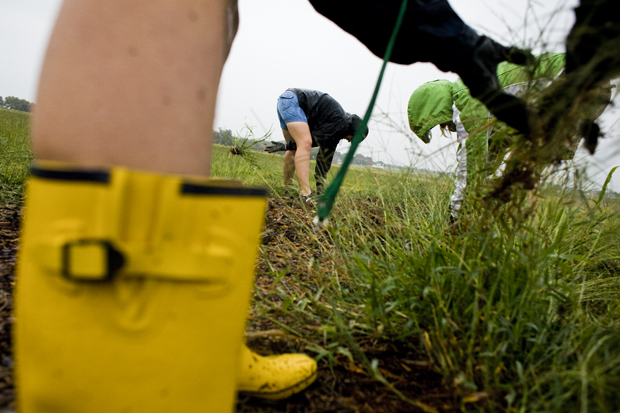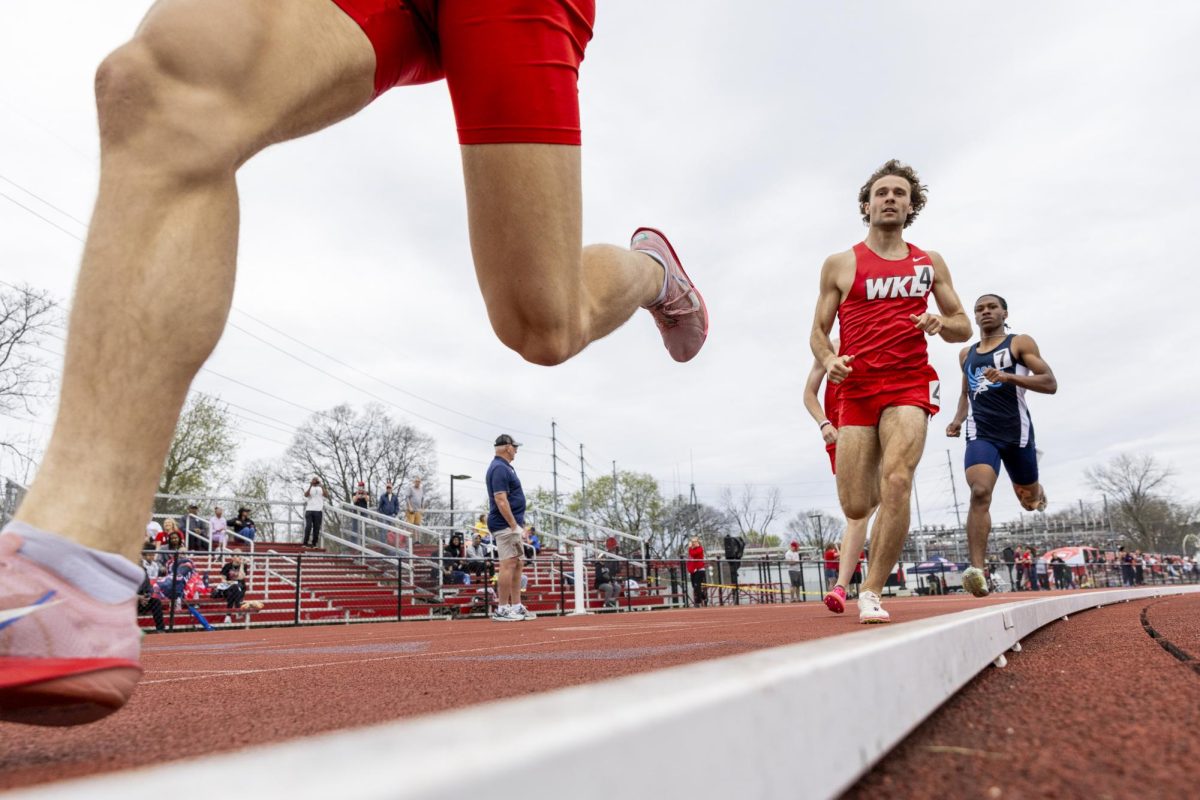‘Every little bit helps’: Tackling sustainability as a college student
Students pull weeds at the sustainability garden at the WKU farm on Sept. 10 as part of a sustainable gardening class. The class offered students the opportunity to learn first hand how to plant their own garden. Students planted strawberries, blueberry bushes, swiss chard and various other plants.
November 29, 2022
WKU is known for the beauty of its campus – from fall leaves to cherry blossoms to views at the top of the hill, the influence of nature throughout social and academic spaces is strong.
But fall leaves are changing colors slower and falling faster, shortening the peak “fall color” season. Students might see the cherry blossom trees blooming earlier in the spring semester.
These might be the only noticeable changes to the WKU community, but across the globe, human influence on the environment has altered the natural world.
Climate change, or long term shifts in temperature or weather patterns, has been driven by the burning of fossil fuels and other activities that release greenhouse gas emissions into the atmosphere. The consequences of climate change on nature – and on humans – are severe, causing events like droughts, rising sea levels, catastrophic storms and wildfires.
Despite this, there are many solutions to combating climate change on a government, corporate and individual level. Promoting a sustainable lifestyle – understanding our dependence on the natural environment and how to exist in harmony with it – is one of these solutions.
The task of sustainability as a college student seems daunting. Finding resources for sustainability education, high prices of sustainable products and difficulties in understanding how individual actions can make a difference in the face of global climate change all contribute to this.
Some students at WKU are working to tackle these barriers – making sustainability more approachable for others and themselves.
Trevor Harry, a fourth year environmental science and Chinese major, is the president of GreenToppers – a campus organization dedicated to providing a space for any student interested in sustainability.
“We’re not major-specific, our demographic is not; the purpose of our club is not super intense [or] complicated sustainability work,” Harry said. “It’s just like providing a platform and an opportunity for students to learn about sustainability who may not have the time from their major or know the resources to do that. I think that provides opportunity for people who may not have that.”
Food production, specifically of meat and dairy, is a leading cause of greenhouse gas emissions due to land-clearing for fields, nitrogen used in fertilizers and methane released from cows and sheep. Making industrial agriculture and animal-rearing cleaner and more efficient is a necessary solution for climate change – one that also includes the consumer.
For this reason, a large part of building a sustainable lifestyle is in food choices. For college students, the jump to an entirely sustainable diet seems impossible, whether that is due to high prices of organic products or a lack of availability.
However, choosing specific parts of meals to source sustainably is a way to combat this, according to Harry, due to differences in climate impact from meat and plants.
“If you buy the meat sustainably produced and spend more money on that, then you can save with cheaper vegetables,” Harry said. “Although it’s not as much as you can do, it’s small steps like that and adjusting your mindset from like, ‘oh, I just can’t afford anything sustainable and nothing is going to be good for the environment’. That just makes you feel guilty and kills your drive to be sustainable.”
Katelyn Johnston, a sophomore English major, is a cofounder of Clean4Change Kentucky, an organization started in 2019 with the purpose of educating and organizing on climate change and sustainability.
“As a college student living on campus, you see how often things are wasted and destroyed, and just like how much waste we produce daily,” Johnston said. “[…] You’re living very closely with your peers. So if you are living sustainably as a student, it’s like you can see the impact that you’re making.”
Johnston also understands the pressure that comes with finding a sustainable lifestyle, especially as a student living on campus. Like Harry, she agrees that no matter the size of sustainable actions, creating a sustainable lifestyle that works for you is what truly makes a difference.
“Nobody is going to live a perfect sustainable lifestyle, that’s just not attainable, especially for college students,” Johnston said. “Because it is not in our price range, and that’s something that I understand and I know, because I’ve tried to live a perfect sustainable lifestyle, and it’s so hard. But one of the things that is so important to realize is that every step really does matter. Even if you weren’t seeing the effects of it right away […] it is still going to matter in the long run.”
Johnston described Clean4Change’s message as a hope that everyone, including college students, aspire to live a sustainable lifestyle. However, she understands the vastness of the climate change issue – which is why Clean4Change also encourages sustainability work on a political level.
“All people in the world should aspire to live a sustainable friendly lifestyle and everything like that,” Johnston said. “However, this is a systemic issue. We say that, if you can do this, you should, if you can’t, that’s fine, but also here’s the ways that you can contact your representative. Here’s the ways that you can actually fight for change in your community. Here’s some petitions you can sign, things like that.
Johnston understands the difficulty in not seeing the direct effect of sustainable actions, so Clean4Change is working towards showing others small ways to help.
“We focus on the systemic part as well as the personal part, because I feel like also a lot of people like the idea of ‘my actions do make a difference,’ and like ‘me doing the small things will help,’ because it’s really hard to feel like you’re totally out of control,” Johnston said. “[…] I think that we try really hard to be like, ‘hey, here’s how you can try and help it, but if that’s not how you can, if you can’t do that, that’s fine.’”
The push for individuals to be more sustainable has been followed by companies creating lines of sustainable products, in order for consumers to be more conscious of the environmental impact of their purchases.
Yet, some companies market products as sustainable even though more time and money is placed into the idea of sustainability rather than the actual environmental effects, a marketing technique called greenwashing.
Harry said this is why students looking to live more sustainable lifestyles must think critically about the products they buy.
“It’s kind of like a fallacy of ‘we’re so sustainable’,” Harry said. “[…] Like, ‘we [companies] care so much about the environment, there’s no plastic’, but in reality, that might not be the case, and then you pay more for something that’s actually not even sustainable.”
According to Johnston, buying “green” or organic products isn’t the only way to sustainably use items – using up what you already have is more important than buying new items.
“It’s not sustainable to throw something away just because this isn’t the sustainable version of it, like not using it up completely,” Johnston said. “That’s one of the things that I’ve tried to do in my life – just use everything up completely.”
Johnston said recycling is one of her main means of staying sustainable and how Clean4Change provides information on why recycling makes a difference.
“I personally recycle everything that I can,” Johnston said. “One of the things that we do with Clean4Change is we have little informational posts, we call them Sustainable Sundays […] We’ll talk about how you can recycle, what exactly you can recycle, why recycling actually does matter.”
Harry explained how he believes WKU’s recycling program could use more time and investment, but that is not the fault of those currently working on the program, as recycling is not a “profitable enterprise”.
“If we can invest the resources to figure out how to make it sustainable, then I think that could be a really good way to minimize waste on campus, because campus itself produces an insane amount of waste,” Harry said. “That’s expected whenever you have 20,000 people living in like one or two square miles, it’s going to produce a lot of waste.”
Harry said the WKU Restaurant Group does a good job of sourcing food locally, which benefits WKU’s overall sustainability. However, Harry said providing more vegan and vegetarian options would be more accommodating and help further in “minimizing our [carbon] footprint.”
Leslie North, director of the WKU office of sustainability, described the role of campus sustainability as a subject that isn’t limited to one part of the WKU community.
“Sustainability is one of those things that bridges across all sectors of operations, and that includes academic affairs as well as facilities and operations, enrollment and student experience divisions,” North said. “Because of that, the role of the Office of Sustainability at WKU is to help coordinate activities across all of them, because sustainability doesn’t live in any one of those other divisions alone. It really does need to involve all of them for many of the projects that we do.”
According to North, the key to individual sustainability is realizing that every action will make a difference, big and small; something that alleviates the guilt that comes with not living a “perfect” sustainable life.
“Even as the director of sustainability, I find myself overwhelmed sometimes or feeling a guilt or something,” North said. “ […] But what I tell everybody is every little thing helps. Even if you just start with just one small change that you want to make or implement into your lifestyle. No matter what that is. Just start with one and then it does tend to snowball from there.”
North explained these small changes could be things like being more vigilant when recycling, carpooling more often or eating vegetarian once a week.
She said for students to remember “every little bit helps,” even though it might be difficult to understand their impact. For example, recycling a single cup yourself seems pointless, but encouraging every individual to recycle that one cup creates a huge impact on the environment.
Despite this, there are difficulties in truly reaching students and individuals about sustainability because of the fear that nothing will make a difference in the face of climate change.
“I think the reason for that is just because in many regards, there’s just so much information everywhere you turn,” North said. “No matter what the messaging is, or no matter what the opportunities are, it’s very easy for them to get lost in the noise of all of the other messaging and all of the other information.”
North said overcoming this is vital, since the college student demographic is a necessary group to teach about sustainability because of the change that happens when students use their voices.
“I think it’s really important for college students to voice their concerns. Let us know when they want to see things differently,” North said. “There’s been several instances across campus where we’ve changed things, not just our campus but other places have [been] changing because that’s what the students really felt passionate about, and that’s what they wanted to see happen from their university, and universities are supposed to be leaders in their communities.”
According to Harry, teaching college students about building a sustainable lifestyle now is vital to ensuring these habits are carried into adulthood, when more time and resources can be dedicated to sustainability.
“Whenever we go into the workforce, and actually have money to spend, those decision making processes that we’ve now practiced for four years, that’s going to follow us into adulthood and into how we make adult purchases about things that are bigger in scale and more consequential,” Harry said.
Johnston agreed that as a college student, learning and experiencing new things is a key part, so sustainability as a new perspective should be included. She believes it is the generation of college students now that will ultimately be able to combat climate change.
“We’re the generation that’s going to be able to make a difference and we’re the generation that is inheriting this earth,” Johnston said. “We are the only ones that are going to be able to say, ‘this does suck and we need to make a difference.’ […] Being able to show people what is actually going on in our world with climate change and things like that, this is the time when they’re going to listen.”
Content editor Alexandria Anderson can be reached at alexandria.anderson337@topper.wku.edu.















